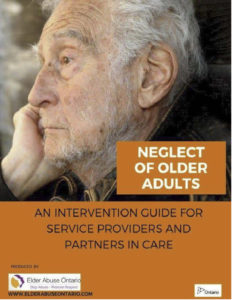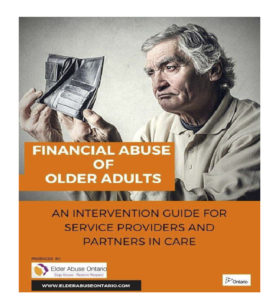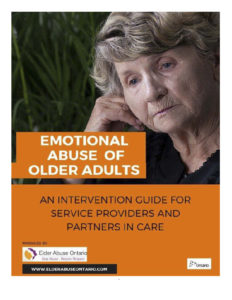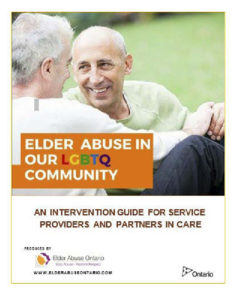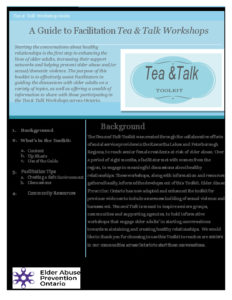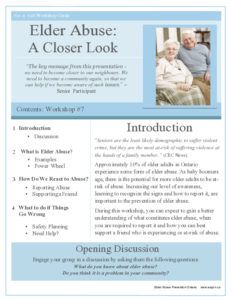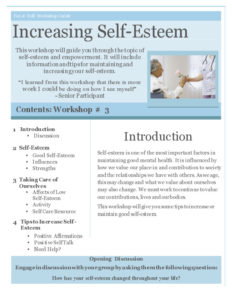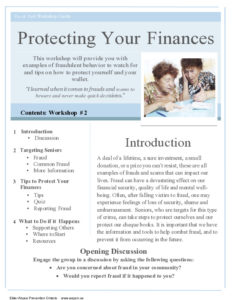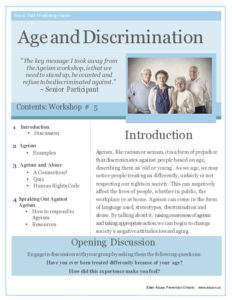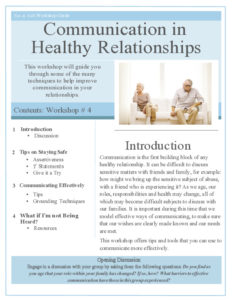Choose a topic from the categories below.
Bereavement
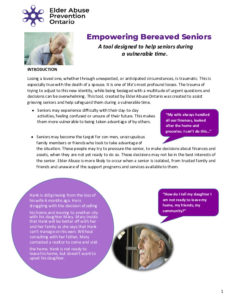 This tool was created to assist grieving seniors and help safeguard them during a vulnerable time. This resources provides case scenarios of emotional and financial case that are accompanied with helpful tips to prevent elder abuse and neglect as well as actions to encourage empowerment and advocacy to promote senior’s rights.
This tool was created to assist grieving seniors and help safeguard them during a vulnerable time. This resources provides case scenarios of emotional and financial case that are accompanied with helpful tips to prevent elder abuse and neglect as well as actions to encourage empowerment and advocacy to promote senior’s rights.
Intervention Guidelines for Service Providers and Partners in Care
A series of ‘Training Guides’ on the forms of elder abuse have been designed to provide a standardized format for learning the facts about elder abuse. Each Guide includes sections on: Definitions, Risk Factors and Warning Signs, Interview Strategies, Safety Planning, Reporting and Legislation, Case Studies and Provincial Resources to support older adults. Each of these sections can be used separately, to teach about specific subject areas or used in its entirety, to suit a variety of training environments or challenges of time constraints. The Guide can be used by interdisciplinary sectors and allows for opportunities to engage in discussions through the training Guide.
This Guide offers case studies on neglect, reflecting real life stories, which are intended to illicit personal perceptions of the situations, encourage critical thinking regarding a response or intervention, and promote best practices, specific to the person’s role and position.
A series of ‘Training Guides’ on the forms of elder abuse have been designed to provide a standardized format for learning the facts about elder abuse. Each Guide includes sections on: Definitions, Risk Factors and Warning Signs, Interview Strategies, Safety Planning, Reporting and Legislation, Case Studies and Provincial Resources to support older adults. Each of these sections can be used separately, to teach about specific subject areas or used in its entirety, to suit a variety of training environments or challenges of time constraints. The Guide can be used by interdisciplinary sectors and allows for opportunities to engage in discussions through the training Guide.
This Guide offers case studies on Financial Abuse, reflecting real life stories, which are intended to illicit personal perceptions of the situations, encourage critical thinking regarding a response or intervention, and promote best practices, specific to the person’s role and position.
A series of ‘Training Guides’ on the forms of elder abuse have been designed to provide a standardized format for learning the facts about elder abuse. Each Guide includes sections on: Definitions, Risk Factors and Warning Signs, Interview Strategies, Safety Planning, Reporting and Legislation, Case Studies and Provincial Resources to support older adults. Each of these sections can be used separately, to teach about specific subject areas or used in its entirety, to suit a variety of training environments or challenges of time constraints. The Guide can be used by interdisciplinary sectors and allows for opportunities to engage in discussions through the training Guide.
This Guide offers case studies on Emotional Abuse, reflecting real life stories, which are intended to illicit personal perceptions of the situations, encourage critical thinking regarding a response or intervention, and promote best practices, specific to the person’s role and position.
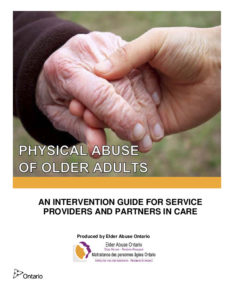 A series of ‘Training Guides’ on the forms of elder abuse have been designed to provide a standardized format for learning the facts about elder abuse. Each Guide includes sections on: Definitions, Risk Factors and Warning Signs, Interview Strategies, Safety Planning, Reporting and Legislation, Case Studies and Provincial Resources to support older adults. Each of these sections can be used separately, to teach about specific subject areas or used in its entirety, to suit a variety of training environments or challenges of time constraints. The Guide can be used by interdisciplinary sectors and allows for opportunities to engage in discussions through the training Guide.
A series of ‘Training Guides’ on the forms of elder abuse have been designed to provide a standardized format for learning the facts about elder abuse. Each Guide includes sections on: Definitions, Risk Factors and Warning Signs, Interview Strategies, Safety Planning, Reporting and Legislation, Case Studies and Provincial Resources to support older adults. Each of these sections can be used separately, to teach about specific subject areas or used in its entirety, to suit a variety of training environments or challenges of time constraints. The Guide can be used by interdisciplinary sectors and allows for opportunities to engage in discussions through the training Guide.
This Guide offers case studies on Physical Abuse, reflecting real life stories, which are intended to illicit personal perceptions of the situations, encourage critical thinking regarding a response or intervention, and promote best practices, specific to the person’s role and position.
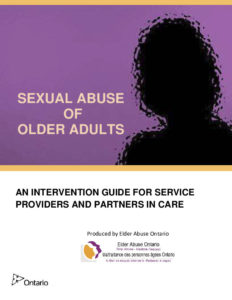 A series of ‘Training Guides’ on the forms of elder abuse have been designed to provide a standardized format for learning the facts about elder abuse. Each Guide includes sections on: Definitions, Risk Factors and Warning Signs, Interview Strategies, Safety Planning, Reporting and Legislation, Case Studies and Provincial Resources to support older adults. Each of these sections can be used separately, to teach about specific subject areas or used in its entirety, to suit a variety of training environments or challenges of time constraints. The Guide can be used by interdisciplinary sectors and allows for opportunities to engage in discussions through the training Guide.
A series of ‘Training Guides’ on the forms of elder abuse have been designed to provide a standardized format for learning the facts about elder abuse. Each Guide includes sections on: Definitions, Risk Factors and Warning Signs, Interview Strategies, Safety Planning, Reporting and Legislation, Case Studies and Provincial Resources to support older adults. Each of these sections can be used separately, to teach about specific subject areas or used in its entirety, to suit a variety of training environments or challenges of time constraints. The Guide can be used by interdisciplinary sectors and allows for opportunities to engage in discussions through the training Guide.
This Guide offers case studies on Sexual Abuse, reflecting real life stories, which are intended to illicit personal perceptions of the situations, encourage critical thinking regarding a response or intervention, and promote best practices, specific to the person’s role and position.
A series of ‘Training Guides’ on the forms of elder abuse have been designed to provide a standardized format for learning the facts about elder abuse. Each Guide includes sections on: Definitions, Risk Factors and Warning Signs, Interview Strategies, Safety Planning, Reporting and Legislation, Case Studies and Provincial Resources to support older adults. Each of these sections can be used separately, to teach about specific subject areas or used in its entirety, to suit a variety of training environments or challenges of time constraints. The Guide can be used by interdisciplinary sectors and allows for opportunities to engage in discussions through the training Guide.
This Guide offers case studies on Elder Abuse in 2SLGBTQ+ Communities, reflecting real life stories, which are intended to illicit personal perceptions of the situations, encourage critical thinking regarding a response or intervention, and promote best practices, specific to the person’s role and position.
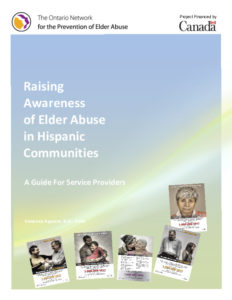 This manual is an educational resource to assist service providers who work with Hispanic and emerging ethno-cultural communities in creating strategies to raise awareness of elder abuse in a culturally and language appropriate manner.
This manual is an educational resource to assist service providers who work with Hispanic and emerging ethno-cultural communities in creating strategies to raise awareness of elder abuse in a culturally and language appropriate manner.
The manual consists of two parts, 1) Examines Hispanic culture in terms of elder abuse providing an overview of the culture, its values, family dynamics and common risks of elder abuse faced by the community 2) A “how to” guide outlining the steps and activities in developing a strategy to raise awareness and help prevent elder abuse in an emerging Hispanic communities.
The manual was developed in collaboration with 17 ethno-cultural community organizations in Ontario who contributed their knowledge, experience to develop this tool and other supporting resources including video scenarios.
Download in: English
Policy
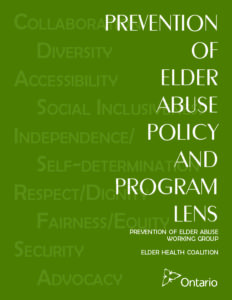 The Prevention of Elder Abuse Policy and Program Lens is an analytical framework to assess policies, programs and practices (in place or proposed) from the perspective of preventing, detecting and responding to elder abuse.
The Prevention of Elder Abuse Policy and Program Lens is an analytical framework to assess policies, programs and practices (in place or proposed) from the perspective of preventing, detecting and responding to elder abuse.
The tool was developed through a partnership between the Ministry for Seniors and Accessibility (Ontario Seniors’ Secretariat) and the Elder Health Coalition.
Tea & Talk Toolkit
Tea & Talk Toolkit is meant to inspire seniors groups, communities and supporting agencies, to hold informative workshops that engage older adults’ in starting conversations towards maintaining and creating healthy relationships. Starting the conversations about healthy relationships is the first step to enhancing the lives of older adults, increasing their support networks and helping prevent elder abuse and/or sexual/domestic violence.
The Toolkit comprised of (8) modules, provides information, tools and resources intended for an older adult audience. These topics include: Communications in Healthy Relationships, Increasing Self-Esteem, Dating, Age Discrimination, Caregiving, Protecting Finances, a Closer Look at Elder Abuse and Sexual Harm. This Guide assists Facilitators in guiding discussions with older adults on these topics.
This Toolkit was created in collaboration with the Kawartha Sexual Assault Centre and EAPO and informed by social service providers in the Kawartha Lakes and Peterborough Regions. EAPO adapted the toolkit for province-wide use.
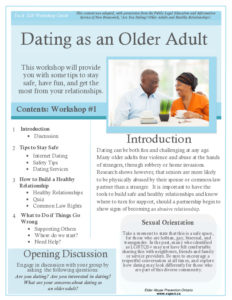
This module of the Toolkit provides older adults with tips to stay safe, have fun, and get the most from their relationships. It integrates tools to build safe and healthy relationships and provides a list of programs and services of where to turn for support, should a partnership begin to show signs of becoming of becoming an abusive relationship.
Communication is the first building block of any healthy relationship. As we age, our roles, responsibilities and health may change, all of which may become difficult issues to discuss with our families. This module provides effective ways of communicating, and grounding techniques to help improve communication in relationships to make sure older adult’s wishes are clearly made known and needs are met. The Toolklit includes tips on staying safe, assertiveness, and resources for support when older adults are not being heard.
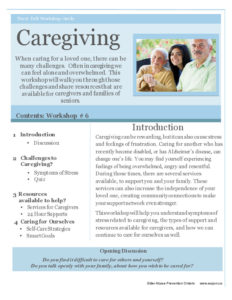 It difficult to care for others and yourself. This module help individuals understand the challenges of caregiving, symptoms of stress related to caregiving, the types of support and resources available for caregivers, and how to develop self-care strategies to care for ourselves to continue to care for others.
It difficult to care for others and yourself. This module help individuals understand the challenges of caregiving, symptoms of stress related to caregiving, the types of support and resources available for caregivers, and how to develop self-care strategies to care for ourselves to continue to care for others.
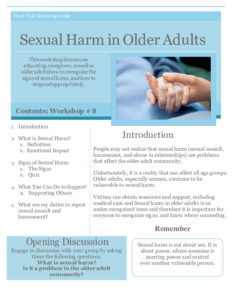 Older adults, especially women, continue to be vulnerable to sexual harm. This module focuses on educating caregivers, as well as older adults on how to recognize the signs of sexual harm, and how to respond appropriately. The Toolkit defines what is sexual harm, its emotional impact on older women, duties to report sexual assault and harassment and what individuals can do to support others.
Older adults, especially women, continue to be vulnerable to sexual harm. This module focuses on educating caregivers, as well as older adults on how to recognize the signs of sexual harm, and how to respond appropriately. The Toolkit defines what is sexual harm, its emotional impact on older women, duties to report sexual assault and harassment and what individuals can do to support others.
Sexual Abuse
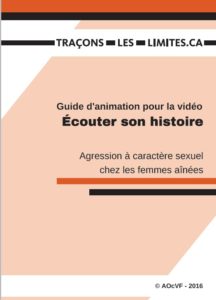 Cette vidéo et ce guide d’animation font partie de la campagne provinciale Traçons-les-limites, qui vise à sensibiliser les personnes de l’entourage à la violence à caractère sexuel.
Cette vidéo et ce guide d’animation font partie de la campagne provinciale Traçons-les-limites, qui vise à sensibiliser les personnes de l’entourage à la violence à caractère sexuel.
Présentation de la campagne Traçons-les-limites
La violence à caractère sexuel existe bel et bien en Ontario. Elle est présente dans toutes les villes et toutes les communautés de la province et elle a des effets sur notre vie, sur celle de notre entourage, comme nos amies et amis, notre famille ou nos collègues, et sur l’ensemble de la société. Elle doit donc être éliminée.
Pour mettre fin à la violence à caractère sexuel en Ontario, nous devons non seulement prendre des mesures pour soutenir les survivantes et tenir les agresseurs responsables de leurs actes, mais également faire de la prévention et de l’éducation publique. Ce type de violence est en effet souvent mal compris et soumis à de nombreux mythes. Le public en général n’a donc pas toujours une réelle compréhension de ce que sont les agressions à caractère sexuel et de leurs impacts, ce qui amène notre société à tolérer ces formes de violence.
Présentation des vidéos
Les vidéos et guides Traçons-les-limites ont été créés pour répondre à un besoin des intervenantes travaillant dans les services et centres d’aide et de lutte contre les agressions à caractère sexuel (CALACS).
Projet développé par Action ontarienne contre la violence faite aux femmes (AOcVF) avec la collaboration de différents partenaires: de Maltraitance des personnes âgées Ontario, du Centre de santé communautaire Hamilton/Niagara, du Centre Novas, CALACS francophone de Prescott-Russell, du Centre Passerelle pour femmes du Nord de l’Ontario
Download in: French
Violence Against Women
Working at the Intersection of the Elder Abuse and Violence Against Women Sectors: An Interdisciplinary Forum of International Leaders to Advance Research, Policy, and Practice
This international knowledge exchange forum, hosted by Women’s College Research Institute at Women’s College Hospital, the Ontario Network of Sexual Assault/Domestic Violence Treatment Centers, and Elder Abuse Prevention Ontario was held in November 2017. The purpose of the forum was to bring together key stakeholders, including established and emerging scholars/researchers, government decision-makers, leaders of professional associations, directors of service provision, and trainees to learn from interdisciplinary and international experts working at the cutting edge of the elder abuse and violence against women sectors.
Five video learning modules were developed that focus on strategies to address violence against older women, and were made possible through funding by the Government of Ontario.
Each learning module is comprised of a video approximately 30 minutes in length. These modules can stand alone or be completed as a series, depending on one’s learning needs.
As you move through these modules, it is essential to consider that older women are not a monolithic group, and in addition to experiences of ageism and sexism, have lived experiences that are further shaped by their unique characteristics and identities such as their sexual orientation, gender identity, social class, race/ethnicity, and occupation. These experiences can impact the rates and nature of violence and access to and interactions with systems and services (CREVAWC, 2016).
View Dr. Janice Du Mont talking about The Learning Network’s 2014 adaptation of the CRIAWI/ICREF’s Intersectionality Wheel Diagram.
Competing Frameworks of Elder Abuse and Violence against Women
Presenter: Dr. Patricia Brownell
Learning Objectives:
- Identify how the differing definitions within each framework are limited in their ability to adequately capture the extent and nature of violence against older women.
- Develop an understanding of how the differing frameworks impact data collection and research methods.
- Develop an understanding of how the differing frameworks impact policy and practice.
- Recognize the Human Rights Perspective as a preferable alternative to the other frameworks.
- Identify recommendations for addressing violence against older women moving forward.
Competing Frameworks of Elder Abuse and Violence against Women
Presenter: Dr. Jane Mears
Learning Objectives:
- Become familiarized with the issues facing older women and the values and activities of the Older Women’s Network in Australia.
- Enhance understanding of how to conduct participatory and collaborative research with and for older women who are victims of abuse.
- Identify how activism and research can be used to develop strategies for structural change on the issue of violence against older women.
- Recognize the need for networking and collaborating across sectors, and with older women, to create sustainable services and equitable policy.
Activism and Advocacy for Bringing About Change for Abused Older Women
Presenter: Ms. Janice Abbott
Learning Objectives:
- Become familiarized with Atira Women’s Resource Society and the support and services they provide women affected by violence.
- Understand what the Promising Practices project is, and how it was developed and implemented.
- Identify the various unique challenges that older women living with violence may face as described in the Promising Practices project.
- Recognize the eleven Promising Practices for working with older women living with violence.
Promising Practices for Responding to Older Women who have Experienced Violence
Presenter: Ms. Margaret MacPherson
Learning Objectives:
- Become familiar with the public education and awareness campaign, “It’s Not Right! Neighbours, Friends, & Families for Older Adults.”
- Recognize the warning signs and risk factors associated with domestic violence in older couples.
- Understand that domestic violence within older relationships is a complex issue with various individual and structural barriers to seeking help.
- Identify strategies for responding safely and effectively to violence in older couples as neighbours, friends, and family members.
Public Awareness and Community Mobilization to Address Domestic Violence in Older Women
Presenters: Ms. Cailin Crockett and Ms. Bonnie Brandl
The objective of this learning module is to understand the importance of collaborating across sectors to advance policy and frontline responses to violence against older women.
The intersectoral collaboration exemplified by Crockett and Brandl demonstrates that we can:
- Increase the visibility and understanding of the problem of violence against older women by promoting the use of age-inclusive language and recognizing gender disparities in policy documents and development.
- Utilize government funding to support training and resources that promote systems change and enhance coordinated community responses to violence against older women.
Module 5 Video text
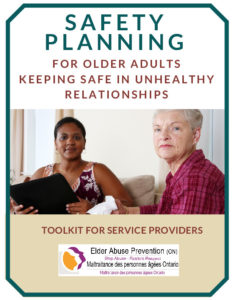 This toolkit was designed for agencies supporting older victims who are vulnerable, at-risk or experiencing abuse. Whether the individual is an older woman or man, the Safety Planning Toolkit provides important information about family and partner violence. It also provides suggestions and strategies to help protect older adults in situations of risk or danger on how to maintain their safety and security.
This toolkit was designed for agencies supporting older victims who are vulnerable, at-risk or experiencing abuse. Whether the individual is an older woman or man, the Safety Planning Toolkit provides important information about family and partner violence. It also provides suggestions and strategies to help protect older adults in situations of risk or danger on how to maintain their safety and security.
The Toolkit uses an approach to answer common questions many older adults ask such as, is my relationship unhealthy? What can I do? Who can help me?
The Safety Planning Toolkit was produced by EAPO in partnership with METRAC Action on Violence funded by The Law Foundation of Ontario.
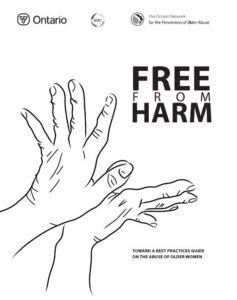 The Guide is a comprehensive resource that incorporates age, gender and cultural contexts, to help build a shared understanding at the community level that further facilitates the co-ordination and implementation of programs and services.
The Guide is a comprehensive resource that incorporates age, gender and cultural contexts, to help build a shared understanding at the community level that further facilitates the co-ordination and implementation of programs and services.
The Guide acknowledges the great diversity of the communities of older women across Ontario. Members of local community coordinating committees that focus on the abuse of older adults or violence against women can use it to facilitate a more integrated regional approach that is responsive to the needs of their individual communities.
The Guide was developed in collaboration with Sheridan Elder Research Centre (SERC) and the Ontario Seniors’ Secretariat (OSS) in 2007.
VIDEOS
Ageism affects us all over the course of our lives but it gets worse as we age. The message we absorb every day is clear: the older you get, the less you matter. Ageism whittles us down and has a direct connection to elder abuse. Time to get free from ageism.
This video was developed by Elder Abuse Prevention Ontario (EAPO), in collaboration with the Canadian Network for the Prevention of Elder Abuse (CNPEA) and the Centre for Research and Education on Violence Against Women and Children (CREVAWC). Funded by the Government of Ontario.
Video available in English and in French.
Video by: Kindea Labs
May, 2023
Length: 1:41
The promised “golden years” may not be so golden for many older adults. It is painful to discover that the older you get, others may not see you as a whole person. EAPO created a video to inform seniors, families, individuals, organizations, and communities about ageism, elder abuse and its impact on older adults. Regardless of gender, many older adults feel invisible because ageism is so common. Ageist words and behaviours are harmful and lead to discrimination and abuse.
The video highlights that in every community, organizations are working together to support you. If you need support or want to talk to someone, reach out to EAPO for a listing of services in your community. Visit: www.eapon.ca The production of the video was done in collaboration with the Canadian Network for the Prevention of Elder Abuse (CNPEA) and the Centre for Research and Education on Violence Against Women and Children (CREVWAC) and funded by the Department of Justice Canada as part of the EAPO’s events for Victims and Survivors of Crime Week (2021).
Produced by: Kindea Labs
January, 2021
Length: 1:41
EAPO created a video to promote individuals, organizations, communities and governments to work together to protect and preserve our human rights. Creating a society where people of all ages are respected and have the opportunity to contribute to the wellbeing of their community is a goal worth working toward. Change is possible. We can create a society that values and respects people of all ages, now and for the generations to come. It’s up to you. What kind of a community do you want to grow old in? Let’s start today. Look for elder abuse networks in your area at www.eapon.ca
Video by: Kindea Labs
May, 2021
Length: 1:41
CNPEA is building a Pan-Canadian Strategy to increase the prevention of elder abuse. EAPO collaborated with CNPEA to develop a roadmap with multiple entry points, which allows each of us, at an individual, organizational, community, and government level to play a role in preventing elder abuse, now and for the generations to come. Change is possible. We all have a role to play. Are you ready? This project is possible thanks to funding from the Department of Justice Victims Fund.
Video produced by: Kindea Labs
June, 2021
Duration: 1:34
French Videos
L’âgisme nous affecte tout au long de notre vie, mais il s’aggrave avec l’âge. Le message que nous absorbons chaque jour est clair : plus on vieillit, moins on compte. L’âgisme nous affaiblit et a un lien direct avec la maltraitance des personnes âgées. Il est temps de se libérer de l’âgisme.
Cette vidéo a été développée par Elder Abuse Prevention Ontario (EAPO), en collaboration avec le Réseau canadien pour la prévention des mauvais traitements envers les personnes âgées (CNPEA) et le Centre de recherche et d’éducation sur la violence faite aux femmes et aux enfants (CREVAWC). Financé par le gouvernement de l’Ontario. Vidéo disponible en anglais et en français.
Vidéo par: Kindea Labs
avril 2023
Durée: 2:30
Les « années d’or » promises ne sont peut-être pas aussi dorées pour de nombreuses personnes âgées. Il est douloureux de découvrir que plus vous vieillissez, les autres peuvent ne pas vous voir comme une personne à part entière.
PMAO a créé une vidéo pour informer les personnes âgées, les familles, les individus, les organisations et les communautés sur l’âgisme, la maltraitance des personnes âgées et son impact sur ces dernières. Quel que soit leur sexe, de nombreuses personnes âgées se sentent invisibles car l’âgisme est très répandu. Les mots et les comportements âgistes sont nuisibles et conduisent à la discrimination et à la maltraitance.
La vidéo souligne que dans chaque communauté, des organisations travaillent ensemble pour vous soutenir. Si vous avez besoin de soutien ou si vous souhaitez parler à quelqu’un, contactez PMAO pour obtenir une liste des services disponibles dans votre communauté.
La production de la vidéo a été réalisée en collaboration avec le Réseau canadien pour la prévention de la maltraitance des personnes âgées (RCNPA) et le Centre de recherche et d’éducation sur la violence faite aux femmes et aux enfants (CREVWAC) et financée par le ministère de la Justice du Canada dans le cadre du Événements de l’EAPO pour la Semaine des victimes et survivants d’actes criminels (2021).
Vidéo par: Kindea Labs
Durée : 1,43
PMEAO a créé une vidéo pour encourager les particuliers, les organismes, les communautés et les gouvernements à travailler ensemble pour protéger et préserver nos droits humains. Bâtir une société dans laquelle les personnes de tous âges sont respectées et ont l’opportunité de contribuer au bien-être de la communauté, c’est un objectif qui mérite notre énergie.
Les particuliers, les organismes, les communautés et les gouvernements se doivent de travailler ensemble pour protéger et préserver nos droits humains. Le changement est possible. Ensemble, nous pouvons créer une société qui valorise et respecte ses citoyens à tous les âges, aujourd’hui et pour les générations à venir. C’est à vous de choisir. Dans quel type de communauté aimeriez-vous vieillir? Commençons dès aujourd’hui.
Vidéo par: Kindea Labs
Durée: 1,46
Cette courte vidéo d’animation traite des attitudes et comportements âgistes envers les personnes âgées et de leur impact sur les personnes âgées. La vidéo encourage les gens à réfléchir à leur propre avenir et à la manière dont ils voudraient être traités avec dignité et respect pour leurs expériences de vie. Il permet aux personnes de tous âges de défendre les droits des personnes âgées et de repousser les messages anti-âge.
La production de la vidéo a été réalisée en collaboration avec le Réseau canadien pour la prévention de la maltraitance des personnes âgées (RCNPA) et le Centre de recherche et d’éducation sur la violence faite aux femmes et aux enfants (CREVWAC) et financée par le ministère de la Justice du Canada dans le cadre du Événements de l’EAPO pour la Semaine des victimes et survivants d’actes criminels (2021).
Vidéo par: Kindea Labs
Durée : 1,27 minutes
Le RCNPA élabore une stratégie pancanadienne pour accroître la prévention de la maltraitance des personnes âgées. L’PMAEO a collaboré avec le RCNPA pour développer une feuille de route avec de multiples points d’entrée, qui permet à chacun de nous, au niveau individuel, organisationnel, communautaire et gouvernemental, de jouer un rôle dans la prévention de la maltraitance des personnes âgées, maintenant et pour les générations à venir. Le changement est possible. Nous avons tous un rôle à jouer. Es-tu prêt?
La production de la vidéo a été réalisée en collaboration avec le Réseau canadien pour la prévention de la maltraitance des personnes âgées (RCNPA) et le Centre de recherche et d’éducation sur la violence faite aux femmes et aux enfants (CREVWAC) et financée par le ministère de la Justice du Canada dans le cadre du Événements de l’EAPO pour la Semaine des victimes et survivants d’actes criminels (2021).
Vidéo par: Kindea Labs
Durée : 1,37
This short animated video that addresses
The production of the video was done in collaboration with the Canadian Network for the Prevention of Elder Abuse (CNPEA) and the Centre for Research and Education on Violence Against Women and Children (CREVWAC) and funded by the Government of Ontario.
Produced by: Kindea Labs
Oct. 2022
Length: 1.08 mins
The video highlights that in
Visit: www.eapon.ca
The production of the video was done in collaboration with the Canadian Network for the Prevention of Elder Abuse (CNPEA) and the Centre for Research and Education on Violence Against Women and Children (CREVWAC) and funded by Government of Ontario.
Video produced by: Kindea Labs
Oct. 2022
Length: 1:11
When you are concerned about an older person’s safety, there are different ways to respond and report to situations:
at home, in care facilities and when there is imminent danger.
This animated video reviews reporting options and resources, including manditory reporting to authorities. We all have a role to play in keeping each other safe.
To learn more, visit Elder Abuse Prevention Ontario : www.eapon.ca
This project is possible thanks to funding from the Department of Justice Victims Fund.
Video Produced by: Kindea Labs
June 2023
Duration: 2:40
Vidéos en français :
Il est temps de parler de la série sur la maltraitance des âinés
La production de la vidéo a été réalisée en collaboration avec le Réseau canadien pour la prévention de la maltraitance des personnes âgées (RCNPA) et le Centre de recherche et d’éducation sur la violence faite aux femmes et aux enfants (CREVWAC).
vidéo réalisée par: Kindea Labs
octobre 2022
Durée : 1,30
La production de la vidéo a été réalisée en collaboration avec le Réseau canadien pour la prévention de la maltraitance des personnes âgées (RCNPA) et le Centre de recherche et d’éducation sur la violence faite aux femmes et aux enfants (CREVWAC).
vidéo réalisée par: Kindea Labs
octobre 2022
Durée : 1,28
La production de la vidéo a été réalisée en collaboration avec le Réseau canadien pour la prévention de la maltraitance des personnes âgées (RCNPA) et le Centre de recherche et d’éducation sur la violence faite aux femmes et aux enfants (CREVWAC).
vidéo réalisée par: Kindea Labs
octobre 2022
Durée : 1,28
La production de la vidéo a été réalisée en collaboration avec le Réseau canadien pour la prévention de la maltraitance des personnes âgées (RCNPA) et le Centre de recherche et d’éducation sur la violence faite aux femmes et aux enfants (CREVWAC) et financée par le ministère de la Justice du Canada dans le cadre du Événements de l’EAPO pour la Semaine des victimes et survivants d’actes criminels (2021).
vidéo réalisée par: Kindea Labs
Juin 2023
Durée : 1,
PMEAO a produit trois « Public Service Announcement (PSA) » afin de mieux sensibiliser le public à la violence à l’égard des aînés et informer le public quant à l’aide disponible en Ontario. Ces PSA ont été diffusés à la télévision ainsi que sur le Web et les médias sociaux. (2019)
Ce PSA diffusé en français est sur l’exploitation financière des personnes âgées
Vidéo: 0:35
Prévention des mauvais traitements envers les aînés Ontario a produit trois messages d’intérêt public (ASP), à la fois en anglais et en français, pour accroître la sensibilisation aux mauvais traitements envers les aînés et informer le public sur les endroits où demander de l’aide en Ontario. Ces messages d’intérêt public ont été diffusés à la télévision et partagés sur le Web et les médias sociaux. (2019)
Ce message d’intérêt public produit , se concentre sur l’abus financier des personnes âgées.
Vidéo: 0:35
English Videos
An elder abuse video scenario that highlights emotional, physical and financial abuse of an older adult living with adult daughter and granddaughter, who are experiencing stress at work and dealing with the demands of managing a family.
Video: 3:16
An educational elder abuse video scenario that highlights emotional and financial abuse by a grandson who stops in to visit his grandmother. Issues of ageism are portrayed. (2015)
Video: 4:36
French Videos
PMEAO a produit trois « Public Service Announcement (PSA) » afin de mieux sensibiliser le public à la violence à l’égard des aînés et informer le public quant à l’aide disponible en Ontario. Ces PSA ont été diffusés à la télévision ainsi que sur le Web et les médias sociaux. (2019)
Ce message d’intérêt public diffusé en français porte principalement sur la violence psychologique chez les aînés
Vidéo: 0:35
French Videos
PMEAO a produit trois « Public Service Announcement (PSA) » afin de mieux sensibiliser le public à la violence à l’égard des aînés et informer le public quant à l’aide disponible en Ontario. Ces PSA ont été diffusés à la télévision ainsi que sur le Web et les médias sociaux. (2019)
Ce PSA diffusé en français est surtout axé sur la violence physique chez les aînés.
Vidéo: 0:35
Vidéos
Agression à caractère sexuel chez les femmes âgées. Avec Guide d’animation pour la vidéo Écouter son histoire: Agression à caractère sexuel chez les femmes aînées
QUIZZES
French Videos
PMEAO a produit trois « Public Service Announcement (PSA) » afin de mieux sensibiliser le public à la violence à l’égard des aînés et informer le public quant à l’aide disponible en Ontario. Ces PSA ont été diffusés à la télévision ainsi que sur le Web et les médias sociaux. (2019)
Ce message d’intérêt public diffusé en français porte principalement sur la violence psychologique chez les aînés
Vidéo: 0:35


